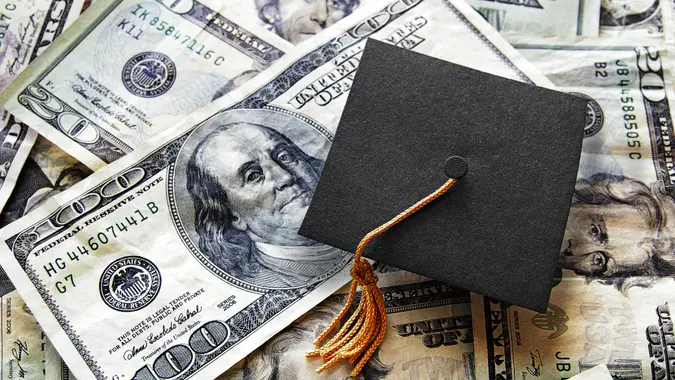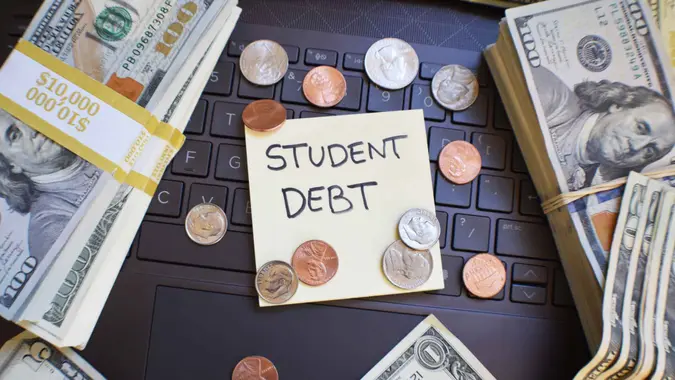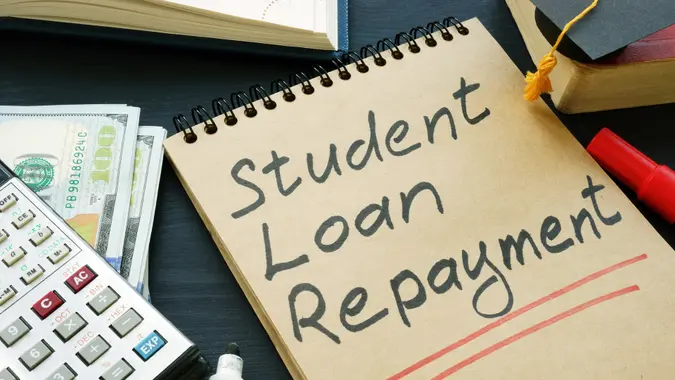Do Student Loans Affect Buying a House? Tips for Getting Approved

Commitment to Our Readers
GOBankingRates' editorial team is committed to bringing you unbiased reviews and information. We use data-driven methodologies to evaluate financial products and services - our reviews and ratings are not influenced by advertisers. You can read more about our editorial guidelines and our products and services review methodology.

20 Years
Helping You Live Richer

Reviewed
by Experts

Trusted by
Millions of Readers
When reviewing mortgage applications, lenders consider multiple factors of your financial situation, including your debt-to-income ratio (DTI), credit score and on-time payment history.
Having student loans doesn’t automatically disqualify you from buying a house, even if you have a high balance. However, the loans’ impact on your DTI and your payments’ history impact on your credit score can affect both mortgage approval and interest rates.
Debt-to-Income Ratio and Why It Matters
The DTI ratio compares your monthly debt payments against your monthly gross income. This ratio helps lenders evaluate your ability to manage monthly payments and repay debts.
You can calculate DTI using this formula:
DTI = Monthly Debt Payments ÷ Monthly Gross Income — 100
If your total monthly debt payments equal $1,500 and your gross monthly income is $5,000, you’d divide $1,500 by $5,000 to get 0.30. Multiplied by 100, this gives you a DTI of 30%.
Most lenders prefer a DTI below 36% to approve a conventional mortgage.
Higher student loan payments increase DTI, potentially limiting your borrowing power.
How Student Loans Impact Your Credit Score
Student loans can help and hurt your credit score in a variety of ways:
- On-time payments help build credit, improving mortgage approval chances and demonstrating a responsible financial history.
- Late or missed payments hurt your score, making it harder to qualify for a good loan or potentially increasing your interest rate.
- Length of credit history matters, with student loans potentially boosting your score if managed well.
Student Loan Repayment Plans and Mortgage Approval
There are multiple different types of student loan repayment plans and payment options. Each one may impact how lenders assess your mortgage application.
- Standard repayment plans, which have fixed monthly payments, easier for lenders to assess.
- Income-driven repayment (IDR) plans, which can lower DTI but may affect loan approval if payments are too low.
- Deferment or forbearance, which some lenders still factor in estimated payments, affecting DTI.
Ways to Improve Your Chances of Buying a House with Student Loans
If you have student loans, there are steps you can take to improve your chance of being approved for a mortgage.
1. Lower Your DTI
If you can lower your overall DTI, your chance of mortgage approval increases. Pay down other debts like credit cards or auto loans to decrease your monthly debt obligations.
You can use strategies like the snowball method, which targets the loans with the smallest balances first to help you pay off specific debts faster and potentially improve monthly cash flow.
You can also consider making extra payments on your student loans to reduce the overall balance, or to consider other repayment plans that will lower your monthly obligation.
2. Improve Your Credit Score
The higher your credit score, the better your mortgage terms may be. You can use these strategies:
- Ensure that all payments are made on-time.
- Reduce overall credit card balances.
- Avoid taking new loans before applying for a mortgage; wait until the mortgage is finalized.
- Settle all outstanding debt when possible.
3. Increase Your Income or Savings
A higher income will automatically improve your DTI, even if your monthly obligations remain the same. This can increase mortgage approval chances. You can look for a higher-paying position or take on a side job to make extra money.
You can also save for a larger down payment, which will reduce the overall loan amount you need to borrow and increase lender confidence.
Can You Qualify for a Mortgage with Student Loans?
Yes, you can qualify for a mortgage even if you have student loans. However, multiple factors will impact approval, including the loan type, lender requirements and your financial profile.
Let’s look at an example. If you have a take home pay of $3,000 a month and are requesting a mortgage that would result in a $1,800 a month mortgage payment, lenders would be more likely to approve you if you had a $100 monthly student loan payment compared to a $700 a month student loan payment.
Keep in mind that some government-backed programs have more flexible DTI requirements. These include FHA, VA and USDA loans.
Should You Buy a House If You Have Student Loans?
Buying a house is possible with student loan debt, but financial preparation is key.
Focus on managing debt, improving credit and saving for a down payment.
You can also compare loan options and lender requirements to find the best mortgage deal based on your financial situation. Government-backed programs, for example, may have more flexible DTI requirements.
If you’re unsure if buying a house is right for you, a financial advisor can help.
FAQs About Student Loans and Buying a House
Student loans may make it more complicated to buy a house, but they don’t have to prevent you from purchasing your first home. Let’s look at common questions and answers about student loans and mortgage approvals.- Will student loans prevent me from getting a mortgage?
- Having student loans won’t necessarily prevent you from getting a mortgage. If your current DTI ratio or monthly payments are too high, however, lenders may determine that you aren’t able to pay both a mortgage and the student loans.
- How do lenders calculate student loans in my DTI?
- Lenders calculate your debt-to-income (DTI) ratio by dividing your total monthly debt payments by your gross monthly income, then multiplying by 100. This is a percentage, and includes your student loan payments.
- Can I buy a house while on an income-driven repayment plan?
- Yes, you can buy a house while on an income-driven repayment plan. These plans may actually lower your monthly payment obligations and your DTI, which could help you get approved.
- Should I pay off student loans before buying a house?
- Some people may prefer to pay off their student loans before buying a house for several reasons:
- It shows financial responsibility.
- It reduces their DTI ratio, which may help them qualify for a mortgage.
- It can improve their monthly cash flow, making it easier to afford a mortgage and other home expenses.
- That said, having student loans won’t necessarily prevent you from buying a house. It depends on your exact financial situation and DTI.
- Some people may prefer to pay off their student loans before buying a house for several reasons:
- Do student loans affect my mortgage interest rate?
- Student loans may impact your mortgage interest rate in the following ways:
- A long history of on-time payments could improve your credit score, which may lower your interest rate.
- History of recent late payments may hurt your credit score, which could raise your interest rate.
- High student loan balances or high monthly payments can increase your DTI ratio, which may raise your interest rate.
- Student loans may impact your mortgage interest rate in the following ways:
Our in-house research team and on-site financial experts work together to create content that’s accurate, impartial, and up to date. We fact-check every single statistic, quote and fact using trusted primary resources to make sure the information we provide is correct. You can learn more about GOBankingRates’ processes and standards in our editorial policy.
- FDIC "Thinking About Buying Your First House?"
- Federal Student Aid "Standard Repayment Plan"
- Federal Student Aid "Income-Driven Repayment Plans"
- Federal Student Aid "Get Temporary Relief: Deferment and Forbearance"
 Written by
Written by  Edited by
Edited by 
























